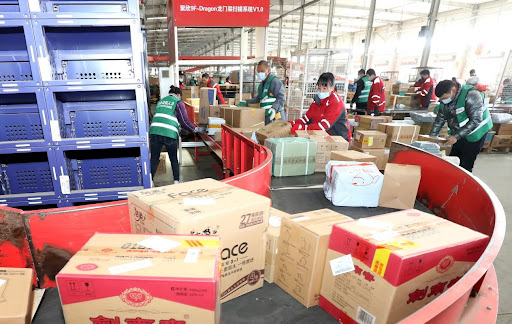Employees of Chinese e-commerce giant JD.com sort express delivery packages at a logistics park
of the company in Luquan district, Shijiazhuang, north China’s Hebei province, Nov. 11, 2021.
(Photo by Liang Zidong/People’s Daily Online)
Singles’ Day shopping festival that falls on Nov. 11 each year, also known as “Double 11”, is one
of the most anticipated date of the year for China’s consumers.
This year, “Double 11” transaction data delivered by major e-commerce platforms in China still
kept an upward trend, signaling the huge potential of the Chinese consumption market.
E-commerce giant JD.com said transaction volume on its platform totaled 349.1 billion yuan
($54.6 billion) during the Single’s Day period, and the figure exceeded what the company had
witnessed last year. In particular, the value of household appliance orders placed on the company’s
platform surpassed 2 billion yuan in the first five minutes after 20:00 pm on Nov. 10.
Tmall, online marketplace of Chinese multinational Alibaba, reported gross merchandise volume
of 540.3 billion yuan during the annual online shopping spree.
A number of small- and medium-sized brands achieved leapfrog growth on the platform. A total
of 698 such brands that racked up over one million yuan during last year’s “Double 11” witnessed
their turnover hitting 10 million yuan in the first 11 days of November this year.
Li Zhengbo, an expert with the China International Electronic Commerce Center, an institute
under the country’s Ministry of Commerce, noted that the sales promotions represented by the
“Double 11” have become important shopping events recognized and accepted by many
consumers. The “Double 11” not only demonstrates the huge potential of China’s consumption
market, but also will further boost consumer confidence, the expert added.
The sales performance of agricultural products was a highlight of this year’s “Double 11,” as e-
commerce platforms both expanded sales channels of these products and improved farmers’
income. For instance, apples directly sourced from Gansu province, were sold out immediately
after they were placed on Taote (Taobao Special Edition) , an e-commerce platform of Alibaba.
On JD.com’s platform, the sales of king crabs surged 600 times from a year ago, and that of
kiwifruits produced in Xiuwen, southwest China’s Guizhou province also grew tenfold.
Just minutes after JD.com officially started the “main course” part of the online shopping spree on
the evening of Nov. 10, a man surnamed Lin in Weinan, northwest China’s Shaanxi province got a
box of kiwifruits he ordered on the company’s platform. It was the one millionth order received by
the JD.com smart supply center in Wugong county, Shaanxi province since the center started trial
operation.
Li believes that the “Double 11” has reshaped consumers’ shopping habits over the past years. The
consumers now pay more attention to the quality of commodities and the delivery service as well,
and they have also become more rational when shopping, the expert explained.
These changes have released new consumption demands and raised higher requirements for e-
commerce platforms, he pointed out. Merchants and logistics enterprises must enhance their
capability to process orders in peak hours, so as to reinforce consumers’ loyalty with constant,
stable and high-quality services.
Sales data during the online shopping spree, as an important indicator of China’s consumption
market, mirrored the trend of consumption upgrading in the country.
The transaction volume of an oxygen concentrator produced by Yuwell, a Chinese medical
equipment solution supplier, exceeded one million yuan just one minute after the “Double 11”
started on JD.com. The platform’s official online pharmacy also witnessed a 100 percent growth in
transaction volume in five minutes after the shopping spree began.
Online retailer Suning.com said middle- and high-end household appliances were hot during this
year’s “Double 11.” The sales of appliance sets grew 46 percent from a year ago, and that of low-
energy-consumption appliances went up 39 percent.
Service consumption was another keyword of this year’s “Double 11” as housekeeping, auto
maintenance, physical check-ups, and home decor services received huge attention from the
consumers. The number of auto maintenance orders on Chinese car maintenance start-up Tuhu
increased nearly 40 percent year on year.
Li Yongjian, a researcher with the National Academy of Economic Strategy, Chinese Academy of
Social Sciences told People’s Daily that the “Double 11” just showed new characteristics for its in-
depth integration of online and offline services. On one hand, online platforms, by employing new
technologies such as AI, further optimized consumption experiences. On the other hand, offline
shopping also went through a transition to offer more convenience for the consumers.
The online shopping spree, experiencing a constant optimization on the supply side, is conducive
to releasing more consumption potential on the Chinese market, and will give consumption a
bigger role in the building of a new development stage, the researcher said.



